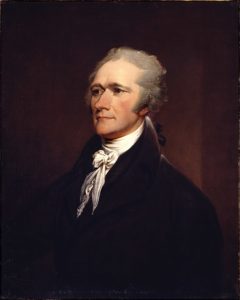
Alexander Hamilton was born in the Caribbean and spent the majority of his youth there. Hamilton’s first job was in the offices of Nicholas Cruger, a merchant and government official. In 1772, Hamilton was persuaded by Cruger and his local reverend to sail off to North America where they knew his genius and quick application of new knowledge would be valued.
Hamilton arrived in New York penniless but managed to attend several preparatory academies. He interviewed with John Witherspoon of the College of New Jersey (now Princeton) but decided to enroll in King’s College (now Columbia). When the Revolutionary War began, Hamilton withdrew from college and enlisted as an American soldier. He quickly rose to serve as General George Washington’s military aide and commanded two battalions in the final American drive to victory at Yorktown.
By the early 1780s Hamilton established himself as New York’s most prominent lawyer. He was selected by the New York legislature as a delegate to the Annapolis Convention and then again to the Constitutional Convention in Philadelphia in 1787.
After signing the Constitution on September 17, 1787, Hamilton returned to New York and spent considerable time arguing in support of ratification of the Constitution. Along with John Jay and James Madison, he authored the Federalist Papers which advanced the argument for a strong central government.
When George Washington assumed the Presidency he appointed Hamilton as his Secretary of the Treasury. In that position, Hamilton shaped American economic policy, developed a plan for paying off the war debt and established the First National Bank. Hamilton was a champion for free trade and commerce among the states. He was a key advisor to President Washington and participated in virtually every decision of his presidency. He left public office in 1795 to return to the private practice of law.
Hamilton’s demise came at the hand of Aaron Burr in a duel in Weehawken, New Jersey. Hamilton had consistently interfered with Burr’s political success, including Burr’s race for the Presidency in the election of 1800. When Burr ran for governor of New York, Hamilton, once again, prevented Burr from winning by opposing his candidacy. An enraged Burr challenged Hamilton to a duel. When both men drew their guns, Hamilton was fatally wounded and died after several days of suffering from the gunshot wound.








